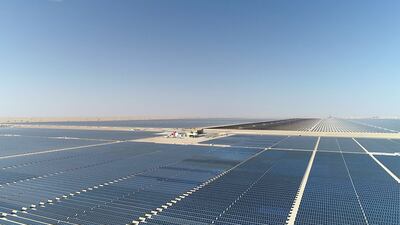The Dubai International Financial Centre is playing the role of a catalyst to boost sustainable finance globally as demand for green funding picks up in the region and beyond, the DIFC governor has said.
Dubai has emerged as a green funding centre as the market for sustainable financing continues to expand rapidly, with sovereigns, corporations and lenders in the region pushing to meet their climate goals by 2050, Essa Kazim told the inaugural Future Sustainability Forum on Wednesday.
“The ESG [environment, social and governance] bonds and sukuk currently outstanding on Nasdaq Dubai represent an aggregate outstanding listing value of $24 billion reinforcing Dubai’s position and growing status as a global hub for sustainable finance,” Mr Kazim said.
As of September 2023, DIFC’s Nasdaq Dubai was the largest ESG sukuk market in the world, accounting for about 64 per cent of the world’s dollar-denominated sustainable sukuk and 46 per cent of the world’s sustainable sukuk issued in all currencies.
Dubai, the commercial and financial centre of the Middle East, is also serving as a regional leader, “influencing neighbouring countries in the Measa [Middle East, Africa and South Asia] region to adopt sustainable finance practices”, Mr Kazim said.
The global sustainable finance market, which was valued at $3.65 trillion in 2021, is projected to hit $22.48 trillion by 2031, growing at a compound annual rate of more than 20 per cent between 2022 and 2031, according to Allied Market Research.
The market for green and sustainable bonds and sukuk is booming in GCC economies in particular, as governments in the oil-rich bloc push to meet their net-zero commitments.
Total GCC green and sustainable bond and sukuk issuances last year reached a record $8.5 billion from 15 deals, compared with $605 million from six deals in 2021, amid increased participation from banks and government-related entities, data from Bloomberg’s Capital Markets League Tables showed.
Green and sustainable finance issuance to fund environmentally friendly projects grew by 32 per cent in the UAE alone last year, compared with 2021, said consultancy Arthur D Little.
Abu Dhabi Commercial Bank, the UAE’s third-largest lender, in September priced its $650 million green bond as part of its commitment to provide Dh35 billion ($9.53 billion) in green finance by 2030.
In August, Abu Dhabi clean energy company Masdar listed its first $750 million green bond on the London Stock Exchange to fund its new clean energy projects.
In June, Commercial Bank of Dubai raised $500 million from its debut green bond to fund climate relate projects under its sustainable finance framework.

The Abu Dhabi National Energy Company, better known as Taqa, raised $1 billion from its debut green bond in April, proceeds of which will be used for financing, refinance and investment in green projects.
In May, Majid Al Futtaim Holding, one of Dubai's biggest private sector companies and the Middle East's largest mall operator, raised $500 million through a green sukuk, its fourth in about four years.
The same month, Aldar Investment Properties, the real estate management unit of the emirate’s largest listed developer, Aldar Properties, also raised $500 million through its debut green sukuk to fund acquisitions and meet its sustainability goals.
State initiatives such as the Dubai Clean Energy Strategy 2050 and the UAE Net Zero 2050 and the UAE Vision 2070 blueprints underpin the clear emphasis on “renewable energy adoption, water conservation, waste management and sustainable urban development”, which all require sustainable financing, Mr Kazim said.
As the fastest-growing financial centre in the Measa region, the DIFC is “driving progress in alignment with Cop28’s four-pillar plan on fast-tracking the transition, fixing climate finance, adaptation to protect lives and livelihoods, and making Cop28 fully inclusive”, he said.
On Wednesday, the DIFC also announced its Sustainable Finance Framework with “a positive second-party opinion” review by S&P Global Ratings.
The framework sets out fundraising principles for investments in environmental and social projects that enable sustainable business operations.
“The framework will help raise capital for impact-driven and sustainable projects in and within the centre,” Mr Kazim said.


